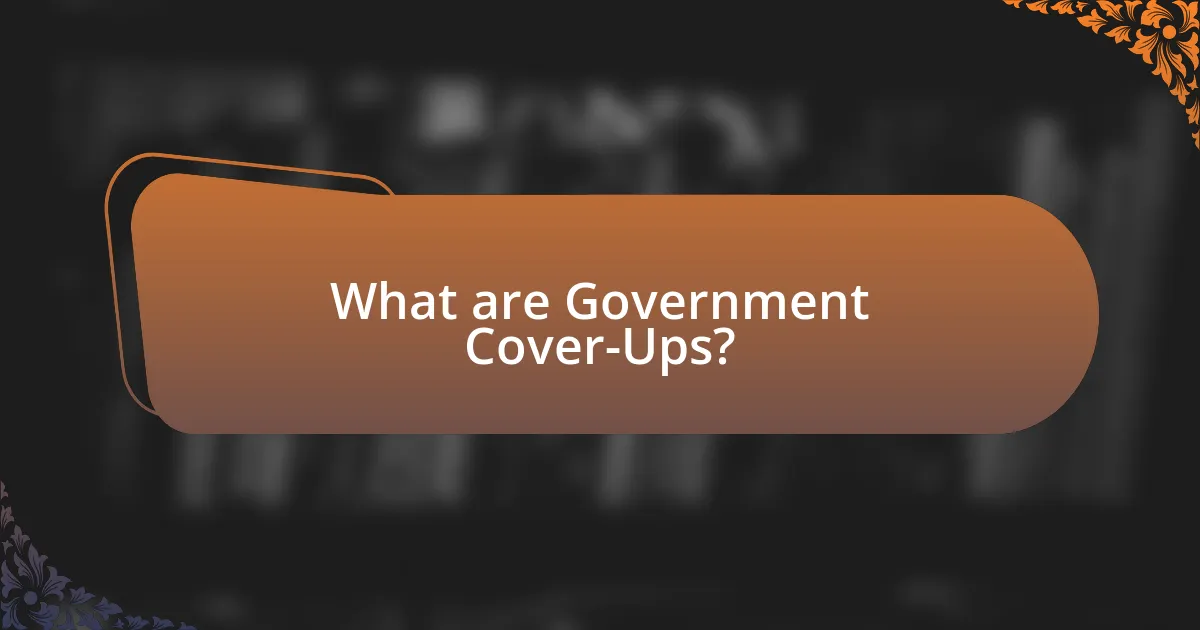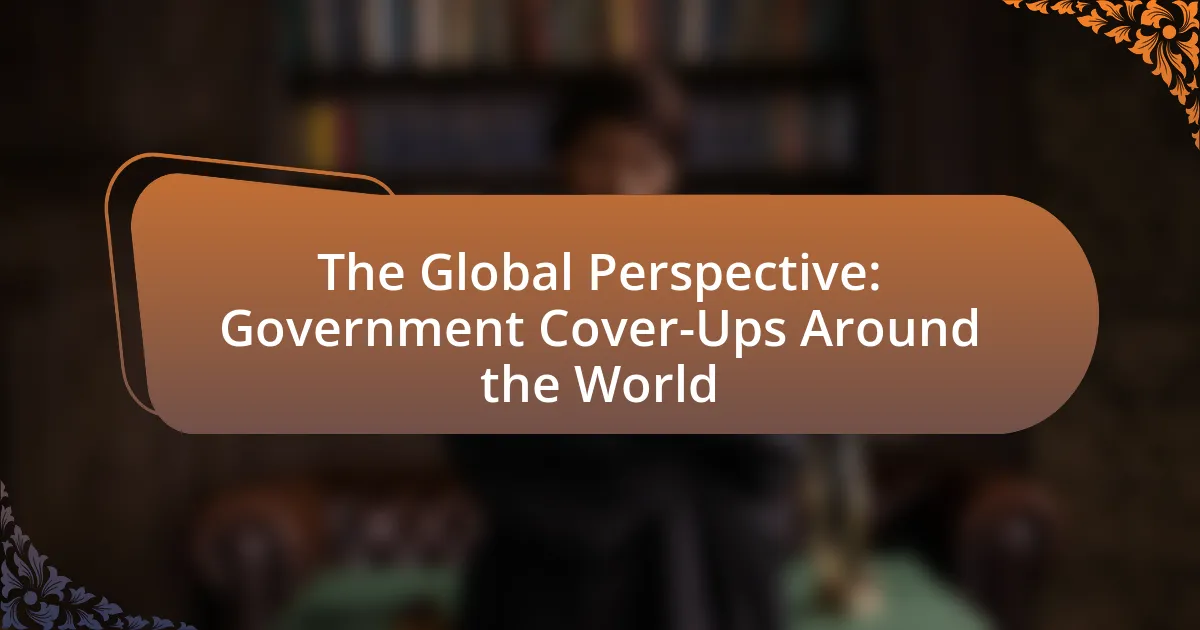Government cover-ups refer to intentional actions by authorities to hide information or actions from the public, often involving misconduct or controversial events. This article explores the global manifestations of government cover-ups, highlighting historical examples such as the Watergate scandal and the Chernobyl disaster, and examining common characteristics like secrecy and misinformation. It discusses the motivations behind these cover-ups, the influence of cultural and political climates, and the consequences on public trust and accountability. Additionally, the article addresses the role of technology and investigative journalism in exposing cover-ups, as well as the legal frameworks and citizen actions that can promote transparency and combat governmental concealment.

What are Government Cover-Ups?
Government cover-ups are deliberate efforts by authorities to conceal information or actions from the public, often involving misconduct or controversial events. These actions can include withholding evidence, manipulating information, or misrepresenting facts to maintain control or protect interests. Historical examples, such as the Watergate scandal in the United States, illustrate how government entities may engage in cover-ups to evade accountability and manage public perception.
How do government cover-ups manifest globally?
Government cover-ups manifest globally through the concealment of information, manipulation of narratives, and suppression of dissent regarding critical events or policies. For instance, the Watergate scandal in the United States exemplifies how government officials attempted to hide their involvement in illegal activities, leading to a significant political crisis. Similarly, the 1986 Chernobyl disaster in the Soviet Union involved the initial downplaying of the incident’s severity, which delayed international response and public awareness. These examples illustrate that governments often prioritize maintaining control over public perception, leading to widespread misinformation and a lack of accountability.
What are the common characteristics of government cover-ups?
Common characteristics of government cover-ups include secrecy, misinformation, and the suppression of evidence. Secrecy is often maintained through classified documents and restricted access to information, as seen in cases like the Watergate scandal, where key details were hidden from the public. Misinformation is frequently disseminated to mislead the public or divert attention, exemplified by the initial government narratives surrounding the Gulf of Tonkin incident, which were later revealed to be misleading. Suppression of evidence involves the destruction or concealment of documents and testimonies, as demonstrated in various historical instances, such as the Pentagon Papers, where critical information was withheld from the public and Congress. These characteristics collectively illustrate how governments may attempt to manage public perception and maintain control over sensitive information.
How do cultural factors influence government cover-ups?
Cultural factors significantly influence government cover-ups by shaping public perception, trust in authority, and the societal norms surrounding transparency. In cultures with high power distance, such as many Asian countries, citizens may be more accepting of government secrecy, believing that authorities know what is best for society. This acceptance can lead to fewer public demands for accountability, allowing cover-ups to persist without significant opposition. Conversely, in cultures that prioritize individualism and transparency, like those in many Western nations, citizens are more likely to challenge government actions and demand disclosure, making cover-ups more difficult to sustain. Historical examples include the Watergate scandal in the United States, where a culture of skepticism towards authority fueled public outrage and demands for accountability, contrasting with the lack of similar responses in more collectivist societies during scandals.
Why do governments engage in cover-ups?
Governments engage in cover-ups primarily to protect their interests, maintain public order, and avoid political fallout. For instance, during the Watergate scandal in the 1970s, the U.S. government attempted to conceal its involvement in illegal activities to preserve the Nixon administration’s power and credibility. Cover-ups often arise in response to scandals, crises, or failures that could undermine public trust or lead to accountability. Historical examples, such as the Iran-Contra affair, illustrate how governments may prioritize their agendas over transparency, leading to significant consequences when the truth eventually emerges.
What motivations drive governments to conceal information?
Governments conceal information primarily to maintain power and control over the populace. This motivation often stems from the desire to prevent public panic, protect national security, or shield political leaders from accountability. For instance, during the Watergate scandal, the U.S. government attempted to hide its involvement in illegal activities to preserve the administration’s reputation and authority. Additionally, governments may conceal information to manipulate public perception or to avoid scrutiny regarding controversial policies, as seen in various instances of state censorship in authoritarian regimes.
How do political climates affect the likelihood of cover-ups?
Political climates significantly influence the likelihood of cover-ups, as authoritarian regimes and unstable governments often create environments conducive to secrecy and deception. In such political contexts, leaders may prioritize maintaining power over transparency, leading to increased instances of information suppression and manipulation. For example, during the Arab Spring, several governments engaged in cover-ups to hide human rights abuses and dissent, demonstrating how political instability can drive the need for concealment. Additionally, research by the Transparency International in their Global Corruption Report indicates that countries with high levels of corruption and low press freedom are more likely to experience government cover-ups, further supporting the correlation between political climate and the prevalence of such actions.

What are Notable Examples of Government Cover-Ups Worldwide?
Notable examples of government cover-ups worldwide include the Watergate scandal in the United States, the Iran-Contra affair, and the Chernobyl disaster in the Soviet Union. The Watergate scandal involved a break-in at the Democratic National Committee headquarters and subsequent attempts by President Nixon’s administration to cover up its involvement, leading to Nixon’s resignation in 1974. The Iran-Contra affair revealed that the Reagan administration secretly facilitated arms sales to Iran to fund Contra rebels in Nicaragua, violating U.S. law. The Chernobyl disaster, which occurred in 1986, involved the Soviet government’s initial denial of the severity of the nuclear accident, delaying evacuation and response efforts, which resulted in widespread contamination and health issues. These examples illustrate significant instances where governments have attempted to conceal information from the public, often with serious consequences.
What are some historical instances of government cover-ups?
Some historical instances of government cover-ups include the Watergate scandal, the Tuskegee syphilis study, and the Iran-Contra affair. The Watergate scandal involved a break-in at the Democratic National Committee headquarters in 1972 and subsequent attempts by the Nixon administration to cover up its involvement, leading to President Nixon’s resignation in 1974. The Tuskegee syphilis study, conducted from 1932 to 1972, involved the unethical treatment of African American men who were misled about their health status and denied treatment for syphilis. The Iran-Contra affair, occurring in the 1980s, involved the secret sale of arms to Iran to fund Contra rebels in Nicaragua, which was a violation of U.S. law and led to significant political fallout. Each of these instances demonstrates how governments have engaged in deceptive practices to conceal actions from the public.
How did the Watergate scandal exemplify a government cover-up?
The Watergate scandal exemplified a government cover-up through the Nixon administration’s efforts to conceal its involvement in the break-in at the Democratic National Committee headquarters. This cover-up involved the misuse of executive power, including the obstruction of justice, the payment of hush money to the burglars, and the manipulation of federal agencies to impede investigations. Key evidence, such as the White House tapes, revealed that President Nixon and his aides actively sought to mislead the public and law enforcement, demonstrating a systematic attempt to hide the truth. The scandal ultimately led to Nixon’s resignation in 1974, marking a significant moment in U.S. history that highlighted the dangers of unchecked governmental authority and the importance of accountability.
What lessons were learned from the Iran-Contra affair?
The Iran-Contra affair taught critical lessons about government accountability and the importance of adhering to legal frameworks. Specifically, it highlighted the dangers of circumventing established laws for political objectives, as the U.S. government engaged in secret arms sales to Iran while simultaneously funding Contra rebels in Nicaragua, violating the Boland Amendment. This incident underscored the necessity for transparency in government operations and the need for checks and balances to prevent abuse of power, as evidenced by the subsequent investigations and revelations that led to a loss of public trust in government institutions.
How do contemporary cover-ups differ from historical ones?
Contemporary cover-ups differ from historical ones primarily in their reliance on digital technology and social media for both execution and exposure. In the past, cover-ups often depended on traditional media and limited communication channels, which made it easier for authorities to control narratives. For instance, the Watergate scandal in the 1970s unfolded through investigative journalism and print media, whereas modern cover-ups, such as those related to government surveillance or corporate malfeasance, can be rapidly disseminated and challenged through platforms like Twitter and Facebook. This shift has led to increased public scrutiny and faster mobilization of grassroots movements, as seen in the global response to the Edward Snowden revelations in 2013, which utilized online platforms to spread information widely and quickly.
What role does technology play in modern government cover-ups?
Technology plays a significant role in modern government cover-ups by facilitating information control and manipulation. Governments utilize advanced surveillance systems, data encryption, and social media algorithms to suppress dissent and obscure the truth. For instance, the use of artificial intelligence in monitoring online communications allows authorities to identify and target whistleblowers or activists who may expose wrongdoing. Additionally, the rapid dissemination of misinformation through digital platforms can create confusion and divert public attention from critical issues. Historical examples, such as the use of technology in the Edward Snowden case, illustrate how governments can leverage digital tools to manage narratives and maintain secrecy.
How has public awareness changed the dynamics of cover-ups?
Public awareness has significantly altered the dynamics of cover-ups by increasing scrutiny and accountability for governments and organizations. As information dissemination has accelerated through social media and independent journalism, instances of cover-ups are more likely to be exposed, leading to public outrage and demands for transparency. For example, the Watergate scandal in the 1970s highlighted how investigative reporting could unveil governmental misconduct, resulting in President Nixon’s resignation. Similarly, the exposure of the Flint water crisis in 2015 demonstrated how grassroots activism and media coverage can force governmental entities to address public health failures. These cases illustrate that heightened public awareness not only facilitates the uncovering of cover-ups but also empowers citizens to challenge authority and demand accountability.

What are the Consequences of Government Cover-Ups?
Government cover-ups can lead to significant erosion of public trust in institutions. When governments conceal information, it often results in widespread skepticism and cynicism among citizens, undermining the legitimacy of governmental authority. Historical examples, such as the Watergate scandal in the United States, illustrate how cover-ups can lead to political upheaval, including resignations and loss of public confidence. Additionally, cover-ups can hinder accountability, allowing misconduct to persist without repercussions, as seen in various cases of corporate malfeasance shielded by governmental complicity. Ultimately, the consequences of government cover-ups extend beyond immediate political fallout, fostering a culture of secrecy that can stifle democratic engagement and civic participation.
How do cover-ups impact public trust in government?
Cover-ups significantly erode public trust in government by fostering skepticism and cynicism among citizens. When governments engage in concealment of information, such as the Watergate scandal in the United States, it leads to a perception of dishonesty and a lack of accountability. Research indicates that transparency is crucial for maintaining trust; for instance, a study by the Pew Research Center found that 70% of Americans believe that government transparency is essential for public trust. Consequently, repeated instances of cover-ups can create a long-lasting impact, diminishing the legitimacy of governmental institutions and increasing public disengagement from civic processes.
What are the long-term effects of cover-ups on citizen engagement?
Cover-ups significantly diminish citizen engagement over the long term by eroding trust in government institutions. When citizens perceive that their leaders are hiding information or manipulating facts, they become disillusioned and less likely to participate in civic activities such as voting or community organizing. Research indicates that in instances like the Watergate scandal, public trust in government plummeted, leading to decreased voter turnout and increased political apathy. Furthermore, a study by the Pew Research Center found that transparency issues correlate with lower levels of public participation in democratic processes, highlighting the detrimental impact of cover-ups on civic engagement.
How do cover-ups influence political accountability?
Cover-ups significantly undermine political accountability by obscuring the truth and preventing scrutiny of government actions. When officials engage in cover-ups, they evade responsibility for misconduct, leading to a lack of transparency that erodes public trust. Historical examples, such as the Watergate scandal in the United States, illustrate how attempts to conceal wrongdoing can result in political fallout, ultimately forcing resignations and legal consequences for those involved. This demonstrates that while cover-ups may provide temporary relief for politicians, they often lead to greater accountability demands when the truth is revealed.
What legal repercussions can arise from government cover-ups?
Government cover-ups can lead to significant legal repercussions, including criminal charges against officials, civil lawsuits, and loss of public trust. Criminal charges may arise from violations of laws such as obstruction of justice or conspiracy, as seen in cases like the Watergate scandal, where key figures faced imprisonment. Civil lawsuits can be filed by affected parties seeking damages for harm caused by the cover-up, exemplified by the lawsuits following the Tuskegee Syphilis Study, where the government concealed critical information. Additionally, cover-ups can result in legislative changes aimed at increasing transparency and accountability, as demonstrated by the Freedom of Information Act in the United States, which was enacted partly in response to government secrecy.
What laws are in place to prevent government cover-ups?
Laws designed to prevent government cover-ups include the Freedom of Information Act (FOIA) in the United States, which mandates disclosure of government documents upon request, thereby promoting transparency. Additionally, whistleblower protection laws, such as the Whistleblower Protection Act, safeguard individuals who expose wrongdoing within government agencies, encouraging the reporting of unethical practices. These laws are supported by historical instances, such as the Watergate scandal, which highlighted the need for accountability and transparency in government operations.
How effective are whistleblower protections in exposing cover-ups?
Whistleblower protections are highly effective in exposing cover-ups, as they provide legal safeguards that encourage individuals to report misconduct without fear of retaliation. For instance, the Whistleblower Protection Act in the United States has led to significant disclosures, including the exposure of the Watergate scandal and various corporate fraud cases. Studies indicate that organizations with strong whistleblower protections see a higher rate of reporting, which correlates with a decrease in unethical behavior. Furthermore, the European Union’s Whistleblower Protection Directive aims to enhance protections across member states, demonstrating a global recognition of their importance in uncovering governmental and corporate malfeasance.
What can citizens do to combat government cover-ups?
Citizens can combat government cover-ups by actively engaging in transparency advocacy, utilizing whistleblower protections, and leveraging social media for information dissemination. Engaging in transparency advocacy involves supporting organizations that promote open government initiatives, which can lead to increased accountability. Utilizing whistleblower protections allows individuals to report misconduct without fear of retaliation, as established by laws like the Whistleblower Protection Act in the United States. Additionally, leveraging social media enables citizens to share information rapidly, mobilizing public opinion and pressuring governments to address cover-ups, as seen in movements like the Arab Spring, where social media played a crucial role in exposing government actions.
How can individuals promote transparency in government?
Individuals can promote transparency in government by actively engaging in civic activities such as attending town hall meetings, participating in public forums, and advocating for open data initiatives. These actions allow citizens to voice their concerns, ask questions, and demand accountability from elected officials. Research indicates that increased public participation leads to greater government transparency, as seen in the Open Government Partnership, which has successfully encouraged countries to adopt transparency measures. By leveraging social media platforms, individuals can also raise awareness about government actions and mobilize community support for transparency initiatives, further reinforcing the demand for open governance.
What role do investigative journalists play in uncovering cover-ups?
Investigative journalists play a crucial role in uncovering cover-ups by conducting in-depth research, gathering evidence, and exposing hidden truths. They utilize various methods, such as interviews, public records requests, and data analysis, to reveal information that authorities may attempt to conceal. For instance, the Watergate scandal was significantly uncovered by investigative journalists Bob Woodward and Carl Bernstein, whose reporting led to the resignation of President Richard Nixon. Their work exemplifies how investigative journalism can hold powerful entities accountable and bring transparency to government actions.
